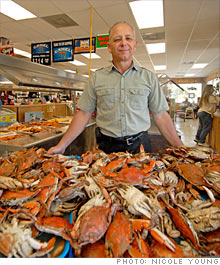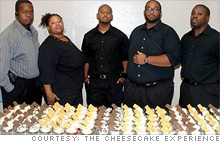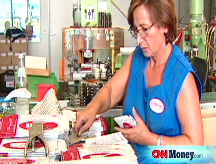Credit crunch freezes hiring, expansion
When small businesses can't get loans, job growth and economic expansion stall.
 |
| Fayard's Grocery owner Rusty Quave is struggling to keep his Gulf Coast business open. |
 |
| The crew at The Cheesecake Experience would like to expand and increase its sales capacity, but can't find a bank loan on reasonable terms. |
 |
| A loan from a community bank was essential to Vers Audio's plan to expand sales of its iPod dock. |
NEW YORK (CNNMoney.com) -- After 41 years in business, Hull Printing shut down its printing presses for good in March, laying off 19 workers and closing one of the oldest family-run businesses in Barre, Vt. The catalyst: Hull Printing's bank slashed its line of credit, kicking off a death spiral that led to the company's collapse.
"All of the equipment's gone and been liquidated," said Jon Hull, 32, whose grandparents started the commercial printing business in 1967. "The bank got all of their money back, but it left a lot of unsecured creditors that will never be paid back, including many other small businesses in town."
Hull's story is a familiar one to millions of small business owners across the U.S. who rely on credit lines and loans to fund expansion or help them recover from setbacks. In a National Small Business Association (NSBA) survey released this week, 67% of business owners polled reported being affected by the credit crunch in August, up from 55% in February. Additionally, 32% reported a deterioration in the terms of available bank loans, up from 27% six months earlier.
"If there is a squeeze on banks, even if only large investment banks, the repercussions can easily flow over into commercial bank loans," says NSBA President Todd McCracken. "Based on what history suggests, if banks have to pull back, they'll pull from small business loans first."
A small business cutback will have ripple effects on the larger economy - and on the jobs pool. Small businesses employ about half of all non-government employees in the U.S., according to Small Business Administration estimates. This year, small companies have been crucial in keeping the job-loss numbers from turning even grimmer: While bigger businesses shed workers, companies with fewer than 50 employees have reported a net increase in positions every month this year, according to ADP, which compiles a monthly employment report. In August, when overall employment fell by 33,000 jobs, small companies added 20,000 net new hires, according to ADP's estimates.
A credit crunch can force companies to make hard choices. "Sometimes there may not be enough work for key staff, so they'll face the choice of losing good people or hanging on to them until they catch the next wave," McCracken said.
In D'Iberville, Miss., Fayard's Grocery owner Rusty Quave is waiting to find out if he'll receive a deferral on loan payments that will mean the difference between staying in business and going under for his general store. For now, Quave has shortened the store's operating hours and temporarily stopped selling gas and diesel as he tries to cut his daily operating costs enough to stay afloat.
Stalled growth
Quave is also the mayor of D'Iberville, a town of 6,000. All around, he sees signs of economic development at a standstill. Shattered three years ago by Hurricane Katrina, D'Iberville responded with a comprehensive urban-development plan for rebuilding. The 60-page document is a blueprint for sustainable retail, residential and industrial development, but little ground has been broken because of the credit-market freeze.
"All the major developers can't come up with the financing," Quave said. "We're a district that has legal gaming. We have groups that have bought property and haven't been able to start."
The NSBA's president says Quave's situation is in line with others he's seen. "For a company that has a growth opportunity, you can still get funding, if you take a lot of energy and time and pull from different places. But companies not in a position to expand may lose money," he said.
While officials in Washington hash out the details of a proposed $700 billion bailout to address the financial-system crisis that began unfolding on Wall Street last week, business owners far from the financial markets' epicenter are already feeling the effects of banks' reluctance to risk new loans.
When entrepreneur Tim Trzepacz and his partner sought funding last year to expand their fledgling product-development company, Sprout Creation in Wayland, Mass., they had the benefit of sterling personal credit and years of experience and networking in their industry: Trzepacz is the former merchandising director at consumer-electronics retail giant Brookstone, where his partner, David Laituri, headed up design and engineering. They also had one product already on the market and generating sales, the Vers iPod dock, available at Target.com (TGT, Fortune 500) and other retailers.
Trzepacz pitched almost a dozen banks. One bank executive "told us we'd be approved unless they pulled our credit history and found out we'd committed mass murders," Trzepacz recalled. They were turned down. Over and over, the pattern repeated: Trzepacz and Laituri would meet with a bank and quickly win over their prospective loan officer. But when that advocate pitched the loan further up the bank hierarchy, it would be shot down. Banks wanted 18 to 24 months of cash flow and a demonstrated operating history before they would consider opening their coffers.
Bank of America (BAC, Fortune 500) agreed to extend the company a line of credit for around $80,000, but it was essentially a credit-card line, carrying interest rates of 15% and up. When Trzepacz sought a higher limit, Bank of America told him to look elsewhere.
In the end, Laituri found salvation literally on his doorstep. Laituri walked into a nearby branch of Middlesex Savings Bank, his local community bank, and asked if they'd be interested in talking about financing his business. Two weeks later, Trzepacz and Laituri had a $200,000 line of credit at interest rates less than half those they'd been paying to Bank of America - and they had a promise that as their business grew, their financing would grow with them.
-
The Cheesecake Factory created smaller portions to survive the downturn. Play
-
A breeder of award-winning marijuana seeds is following the money and heading to the U.S. More
-
Most small businesses die within five years, but Amish businesses have a survival rate north of 90%. More
-
The 10 most popular franchise brands over the past decade -- and their failure rates. More
-
These firms are the last left in America making iconic products now in their twilight. More












